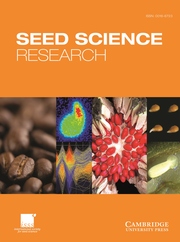Crossref Citations
This article has been cited by the following publications. This list is generated based on data provided by
Crossref.
Elamrani, Abdelhak
Gaudillère, Jean‐Pierre
and
Raymond, Philippe
1994.
Carbohydrate starvation is a major determinant of the loss of greening capacity in cotyledons of dark‐grown sugar beet seedlings.
Physiologia Plantarum,
Vol. 91,
Issue. 1,
p.
56.
Sadeghian, S.Y.
and
Khodaii, H.
1998.
Diallel cross analysis of seed germination traits in sugar beet.
Euphytica,
Vol. 103,
Issue. 2,
p.
259.
Amrani, Abdelhak El
Camara, Bilal
Gaudillère, Jean-Pierre
and
Couée, Ivan
1998.
Accumulation of plastidial alanine-aminopeptidase in relation to plastid damage in cotyledons of dark-grown sugar beet seedlings.
Plant Physiology and Biochemistry,
Vol. 36,
Issue. 3,
p.
263.
Mukasa, Yuji
Takahashi, Hiroyuki
Taguchi, Kazunori
Ogata, Naoki
Okazaki, Kazuyuki
and
Tanaka, Masakatsu
2003.
Accumulation of Soluble Sugar in True Seeds by Priming of Sugar Beet Seeds and the Effects of Priming on Growth and Yield of Drilled Plants.
Plant Production Science,
Vol. 6,
Issue. 1,
p.
74.
de los Reyes, B. G.
Myers, S. J.
and
McGrath, J. M.
2003.
Differential induction of glyoxylate cycle enzymes by stress as a marker for seedling vigor in sugar beet (Beta vulgaris).
Molecular Genetics and Genomics,
Vol. 269,
Issue. 5,
p.
692.
Taguchi, Kazunori
Mukasa, Yuji
Abe, Hideyuki
and
Tanaka, Masakatsu
2004.
Near-Infrared Diffuse Reflectance Spectroscopic Analysis of Ratio of True Seed Weight in Sugar Beet Seed.
Breeding Research,
Vol. 6,
Issue. 4,
p.
179.
Couée, Ivan
Sulmon, Cécile
Gouesbet, Gwenola
and
El Amrani, Abdelhak
2006.
Involvement of soluble sugars in reactive oxygen species balance and responses to oxidative stress in plants.
Journal of Experimental Botany,
Vol. 57,
Issue. 3,
p.
449.
Catusse, Julie
Strub, Jean-Marc
Job, Claudette
Van Dorsselaer, Alain
and
Job, Dominique
2008.
Proteome-wide characterization of sugarbeet seed vigor and its tissue specific expression.
Proceedings of the National Academy of Sciences,
Vol. 105,
Issue. 29,
p.
10262.
Catusse, Julie
Meinhard, Juliane
Job, Claudette
Strub, Jean‐Marc
Fischer, Uwe
Pestsova, Elena
Westhoff, Peter
Van Dorsselaer, Alain
and
Job, Dominique
2011.
Proteomics reveals potential biomarkers of seed vigor in sugarbeet.
PROTEOMICS,
Vol. 11,
Issue. 9,
p.
1569.
Belin, É.
Rousseau, D.
Rojas-Varela, J.
Demilly, D.
Wagner, M.-H.
Cathala, M.-H.
and
Dürr, C.
2011.
Thermography as non invasive functional imaging for monitoring seedling growth.
Computers and Electronics in Agriculture,
Vol. 79,
Issue. 2,
p.
236.
Olesen, Merete Halkjaer
Shetty, Nisha
Gislum, Rene
and
Boelt, Birte
2011.
Classification of Viable and Non-Viable Spinach (Spinacia Oleracea L.) Seeds by Single Seed near Infrared Spectroscopy and Extended Canonical Variates Analysis.
Journal of Near Infrared Spectroscopy,
Vol. 19,
Issue. 3,
p.
171.
Catusse, Julie
Job, Claudette
and
Job, Dominique
2012.
Seed Development: OMICS Technologies toward Improvement of Seed Quality and Crop Yield.
p.
27.
Noah, Alexandre Mboene
Niemenak, Nicolas
Sunderhaus, Stephanie
Haase, Christin
Omokolo, Denis Ndoumou
Winkelmann, Traud
and
Braun, Hans-Peter
2013.
Comparative proteomic analysis of early somatic and zygotic embryogenesis in Theobroma cacao L..
Journal of Proteomics,
Vol. 78,
Issue. ,
p.
123.
Belin, Étienne
Rousseau, David
Benoit, Landry
Demilly, Didier
Ducournau, Sylvie
Chapeau-Blondeau, François
and
Dürr, Carolyne
2014.
Plant Image Analysis.
p.
165.
Pierre, Johann
Teulat, Béatrice
Juchaux, Marjorie
Mabilleau, Guillaume
Demilly, Didier
and
Dürr, Carolyne
2014.
Cellular changes during Medicago truncatula hypocotyl growth depend on temperature and genotype.
Plant Science,
Vol. 217-218,
Issue. ,
p.
18.
Seyyedi, Seyyed Mohammad
Khajeh-Hosseini, Mohammad
Moghaddam, Parviz Rezvani
and
Shahandeh, Hamid
2015.
Effects of phosphorus and seed priming on seed vigor, fatty acids composition and heterotrophic seedling growth of black seed (Nigella sativa L.) grown in a calcareous soil.
Industrial Crops and Products,
Vol. 74,
Issue. ,
p.
939.
Pinheiro, C.
Ribeiro, I. C.
Reisinger, V.
Planchon, S.
Veloso, M. M.
Renaut, J.
Eichacker, L.
and
Ricardo, C. P.
2018.
Salinity effect on germination, seedling growth and cotyledon membrane complexes of a Portuguese salt marsh wild beet ecotype.
Theoretical and Experimental Plant Physiology,
Vol. 30,
Issue. 2,
p.
113.
Seyyedi, S.M.
Tavakkol Afshari, R.
and
Daneshmandi, M.S.
2018.
The relationships between fatty acids and heterotrophic seedling growth in winter canola cultivars during accelerated seed aging process.
South African Journal of Botany,
Vol. 119,
Issue. ,
p.
353.
Martínez-Arias, Rosa
Ronquillo-López, María Gabriela
and
Schechert, Axel
2018.
Quantification of Oil Content in Intact Sugar Beet Seed by Near-Infrared Spectroscopy.
Agronomy,
Vol. 8,
Issue. 11,
p.
254.
Hallahan, Brendan F.
Fernandez-Tendero, Eva
Fort, Antoine
Ryder, Peter
Dupouy, Gilles
Deletre, Marc
Curley, Edna
Brychkova, Galina
Schulz, Britta
and
Spillane, Charles
2018.
Hybridity has a greater effect than paternal genome dosage on heterosis in sugar beet (Beta vulgaris).
BMC Plant Biology,
Vol. 18,
Issue. 1,

